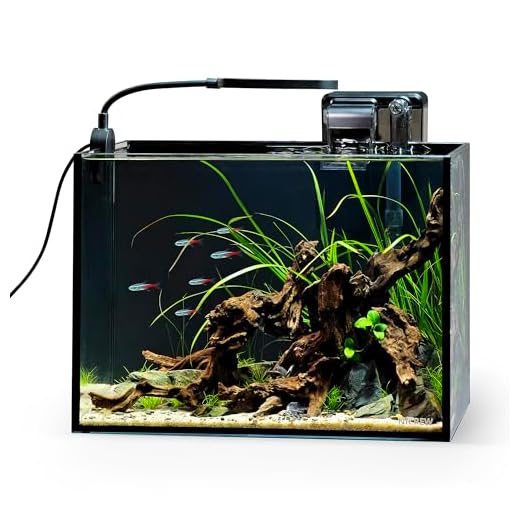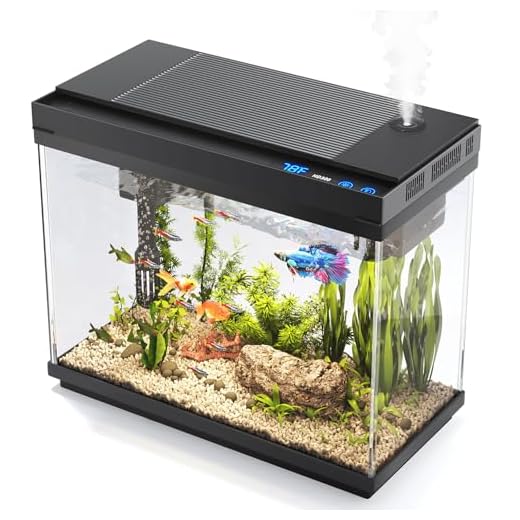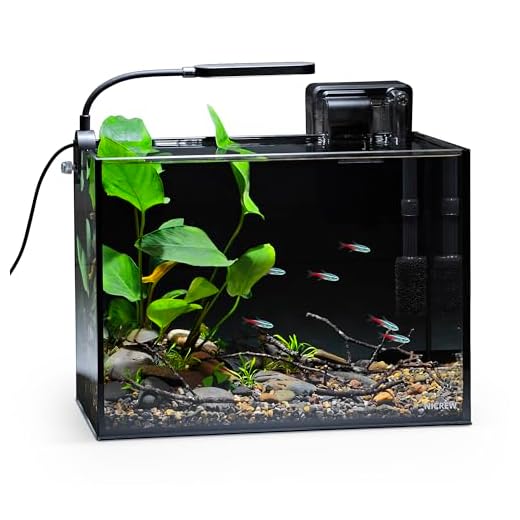Reef
Blog
What fish can live in a small tank

When it comes to keeping fish as pets, many people think that they need a large aquarium or tank to thrive. While this may be true for some species, there are actually quite a few fish that can live happily in a small tank. Keeping fish in a smaller tank can be a great option for those with limited space or for beginners just getting started with fishkeeping.
One of the key factors to consider when choosing fish for a small tank is their size. Fish that stay small as adults are ideal for smaller tanks, as they require less space to swim and grow. Some popular small fish species include guppies, neon tetras, and bettas. These fish are not only beautiful and vibrant but also known for their ability to thrive in small tanks.
Another important consideration is the fish’s behavior and compatibility with other fish. Some fish, such as bettas, are known for their territorial nature and may not do well with other fish in their tank. On the other hand, other species, like neon tetras, are known for their peaceful temperament and ability to easily coexist with other fish. It’s important to research and choose fish that will get along well in a small tank environment.
“One common misconception is that goldfish can be housed in small bowls. However, goldfish actually require a large tank with a filtration system due to their size and waste production.”
Finally, the water parameters and maintenance needs of the fish should also be taken into account. Some fish require specific water conditions, such as temperature and pH levels, to thrive. Additionally, regular water changes and proper filtration are essential for maintaining a healthy environment for the fish. It’s important to understand the specific needs of the fish you choose and ensure that you can meet those requirements in a small tank.
In conclusion, there are many fish species that can live happily in a small tank. By considering the size, behavior, compatibility, and maintenance needs of the fish, you can create a thriving and beautiful underwater ecosystem even in a limited space.
The Best Fish for Small Tanks
When setting up a small fish tank, it’s important to choose fish that are suitable for the size of the tank. Here are some of the best fish that can live happily in small tanks:
- Betta Fish: Also known as Siamese Fighting Fish, Betta fish are famous for their vibrant colors and flowing fins. They don’t require a large tank and can be kept in tanks as small as 2.5 gallons. Just make sure to keep only one Betta fish per tank.
- Neon Tetras: Neon Tetras are small, peaceful fish that can brighten up any tank. They are best kept in schools of at least 6 individuals and can thrive in tanks as small as 10 gallons.
- Dwarf Gouramis: These beautiful fish are known for their vibrant colors and unique patterns. Dwarf Gouramis are small in size and can be kept in tanks as small as 15 gallons.
- Dwarf Corydoras: These small bottom-dwelling fish are great additions to small tanks. They are peaceful and help keep the tank clean. Dwarf Corydoras can be kept in tanks as small as 10 gallons.
- White Cloud Mountain Minnows: These small, active fish are perfect for small tanks. They are hardy, peaceful, and can be kept in groups. White Cloud Mountain Minnows can thrive in tanks as small as 5 gallons.
- Guppies: Guppies are colorful and easy to care for, making them a popular choice for small tanks. They are small in size and can be kept in tanks as small as 5 gallons. Keep in mind that guppies breed quickly, so avoid overcrowding the tank.
Remember, even though these fish can thrive in small tanks, it’s important to provide them with a proper environment, including appropriate filtration, heating, and regular maintenance. Always research the specific requirements of any fish you plan to keep before adding them to your small tank.
Betta Fish
Betta fish, also known as Siamese fighting fish, are popular choices for small tanks due to their vibrant colors and unique personality. These beautiful fish are native to Thailand and are known for their long, flowing fins.
Size and Tank Requirements
Betta fish are small in size, typically growing to about 2.5 inches in length. This makes them well-suited for small tanks, but it’s important to provide them with enough space to swim and explore. A minimum tank size of 2.5 gallons is recommended, but a larger tank is always better.
Water Conditions
Betta fish are tropical freshwater fish and require specific water conditions to thrive. They prefer a water temperature between 76°F and 81°F (24°C to 27°C) and a pH level between 6.5 and 7.5. It’s crucial to provide a proper filtration system and perform regular water changes to maintain optimal water quality.
Betta fish are labyrinth fish, which means they have a unique organ called a labyrinth that allows them to breathe oxygen from the air. This adaptation enables them to survive in oxygen-deprived waters, but they still need access to clean water with adequate dissolved oxygen.
Diet and Feeding
Betta fish are carnivorous and primarily eat insects and their larvae in their natural habitat. In captivity, they can be fed a diet of high-quality betta pellets, as well as freeze-dried or live foods like bloodworms and brine shrimp. It’s important to feed them small portions two to three times a day to prevent overfeeding and maintain their health.
Note: It’s crucial not to house male betta fish together in a small tank, as they are known to be highly territorial and aggressive towards each other. However, female betta fish can sometimes coexist peacefully in larger tanks with proper tank setup and careful monitoring.
In conclusion, betta fish are great choices for small tanks due to their small size and unique characteristics. With proper care and maintenance, they can thrive and provide a beautiful display of colors and personality in your home or office.
Guppies
Guppies are one of the most popular fish for small tanks due to their vibrant colors and easy maintenance. They are small in size, typically growing to only about 2 inches long, making them suitable for small tanks.
These fish are native to South America and are known for their live-bearing nature, which means they give birth to live young instead of laying eggs. This makes them an interesting addition to any aquarium.
Guppies are also known for their adaptability and hardiness, making them a great choice for beginner fish keepers. They can tolerate a wide range of water conditions and temperature fluctuations, although it’s important to maintain stable water parameters for their optimal health.
When it comes to tank setup, guppies thrive in well-planted tanks with plenty of hiding spots. They prefer a temperature range between 72 to 82 degrees Fahrenheit and a pH level between 6.8 to 7.8.
These fish are social in nature and do well in groups, so it’s recommended to keep them in a small school of at least 3 to 5 individuals. They are peaceful by nature and can coexist with other peaceful fish species like tetras, danios, and mollies.
Guppies are omnivorous and will readily eat a variety of foods. They can be fed a combination of high-quality flake or pellet food, as well as live or frozen foods such as brine shrimp, daphnia, or bloodworms.
Overall, guppies are a great choice for small tanks due to their small size, vibrant colors, and easy care requirements. They can bring life and movement to any small aquarium setup.
Dwarf Gourami
The Dwarf Gourami is a popular choice for small tanks. With its vibrant colors and peaceful temperament, it can be a great addition to any aquarium.
Size and Appearance
The Dwarf Gourami is a small fish, typically growing to about 2 inches in length. It has beautiful bright colored scales, with hues of blue, red, and yellow. The males are more colorful than females, with longer fins and intricate patterns.
Habitat and Tank Requirements
These fish are native to the slow-moving waters of South Asia, so they prefer tanks that mimic their natural habitat. A tank size of 10-20 gallons is suitable for a pair of Dwarf Gouramis. It is important to provide them with plenty of hiding spots and dense vegetation to make them feel secure.
Water temperature should be kept between 77-82°F (25-28°C), with a pH level around 6.0-7.5. It is important to maintain good water quality by performing regular water changes and using a reliable filtration system.
Diet and Feeding
Dwarf Gouramis are omnivorous and will eat both plant matter and small organisms. Their diet should include a mix of high-quality flakes or pellets, as well as frozen or live foods such as brine shrimp and bloodworms. It is important not to overfeed them, as they can be prone to obesity.
Behavior and Compatibility
Dwarf Gouramis are generally peaceful and can be kept with other small, non-aggressive fish. However, it is best to avoid keeping them with fin-nipping fish or aggressive species that could bully them. It is also important to note that male Dwarf Gouramis can sometimes be territorial towards each other, so it is best to keep only one male in a tank.
Overall, the Dwarf Gourami is a great choice for a small tank due to its vibrant colors, peaceful nature, and relatively low-maintenance care requirements.
White Cloud Mountain Minnows
The White Cloud Mountain Minnow is a small and peaceful fish that is perfect for a small tank. Native to the mountainous streams of China, this fish is hardy and easy to care for, making it a popular choice for beginner fishkeepers.
Here are a few key characteristics of White Cloud Mountain Minnows:
- Size: White Cloud Mountain Minnows typically reach a maximum size of 1.5 inches (3-4 cm).
- Temperature and pH: These fish prefer slightly cooler water temperatures, ranging from 64-72°F (18-22°C). They thrive in slightly acidic to neutral pH levels, around 6.0-7.5.
- Tank Size: White Cloud Mountain Minnows can comfortably live in a small tank, starting from 5 gallons (19 liters). However, providing a slightly larger tank, such as a 10-gallon (38 liters), will give them more space to swim and explore.
- Behavior: They are a peaceful species that can be kept in groups. A small school of 6-8 individuals will create a stunning display.
- Diet: These fish are omnivorous and will happily eat a variety of foods, including commercial flakes, pellets, and frozen or live foods. It is important to offer a balanced diet to ensure their optimal health.
White Cloud Mountain Minnows do well with other small fish species that share their peaceful nature. They are also compatible with shrimp and snails, adding diversity to a small tank setup.
Overall, White Cloud Mountain Minnows are an excellent choice for a small tank, thanks to their adaptability, peaceful demeanor, and low maintenance requirements. They are a beautiful and active species that will provide enjoyment and interest to any aquarium.
Question & Answer
What are some small fish that can live in a small tank?
Some small fish that can live in a small tank include betta fish, guppies, neon tetras, and dwarf gouramis.
Can goldfish live in a small tank?
No, goldfish cannot live in a small tank. They require a lot of space and produce a high amount of waste, which can quickly lead to poor water quality in a small tank.
How big should a small tank be for fish?
A small tank for fish should ideally be at least 10 gallons (37 litres) in size. This will provide enough space for small fish to swim and ensure proper water quality.
Do small fish require any special care?
Small fish require similar care to any other fish, such as regular feeding, monitoring water parameters, and maintaining proper water temperature. It’s also important to provide them with appropriate tank decor and hiding spots.
Can I keep multiple small fish in a small tank?
Yes, you can keep multiple small fish in a small tank as long as you consider their compatibility and the tank size. It’s important to avoid overcrowding and provide enough swimming space for each fish.
What type of fish can live in a small tank?
There are several types of fish that can thrive in a small tank, such as Betta fish, guppies, or neon tetras.
Can I keep goldfish in a small tank?
No, goldfish require a much larger tank than most other fish. They produce a lot of waste and need plenty of space to swim.





